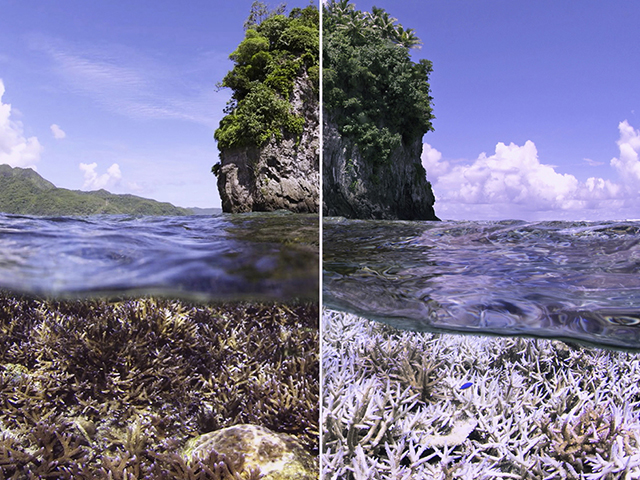Beneath our oceans, coral is disappearing at an alarming rate — the Great Barrier Reef endured its biggest coral loss ever last year — and rising ocean temperatures are to blame, asserts a new documentary, “Chasing Coral.”
The film’s crew traveled to Hawaii, Bermuda, the Bahamas and the shores of Australia’s Great Barrier Reef, where they affixed underwater cameras to the ocean floor and left them to capture footage of coral in an attempt to document the impact of climate change happening in real time.
In the documentary, which is streaming now on Netflix, the experiment turns emotional when the crews revisit the cameras months later and find the brilliantly colored corals that had served as home to schools of fish transformed into decrepit, lifeless and colorless rocks that resemble an abandoned shipwreck — clear evidence of coral bleaching, or coral death.
Salon spoke with “Chasing Coral” director Jeff Orlowski and producer Larissa Rhodes on a recent episode of “Salon Talks” about how the film serves as both a historical document for global climate change and a wake-up call to politicians denying the causal relationship between humans and Earth’s rising temperatures.
Salon’s interview featured an EarthCam live feed of a coral reef aquarium, an example of the symbiotic relationship coral plays in the marine ecosystem.
On why corals are disappearing:
Jeff Orlowski: Coral is an animal and it has a certain temperature where it can’t live anymore. There’s a threshold. Just like our human body — we are comfortable at 98.6 degrees. If you had a fever of 102 for a while, you’d get sick and die pretty quickly. That equivalent is happening in the ocean. The water is getting hotter than the threshold for corals and then they get sick and they turn white and, over time, they then die.
On why a film about coral is needed now:
Larissa Rhodes: One of the things that I didn’t realize is that corals are an animal. They’re part of this ecosystem and other animals depend on them and one of the scientists correctly refers to us [in the film] as one of the bigger animals that may rely on a reef. There are millions of people around the world that rely on reefs for their main source of food and income.
On climate change legislation:
Orlowski: We need a huge shift in our political system to prioritize this. We need to be voting on climate issues. We need to be voting on environmental issues. We need to observe the beauty and prettiness of the natural landscape. […] We need a healthy planet for humans to continue to survive on, so if politicians all across the board are not voting as a priority on this issue, we have a lot of work to do.
Watch the conversation for more on coral reef death and climate change.

